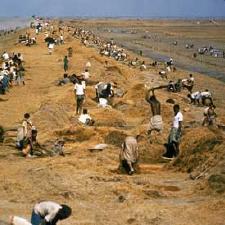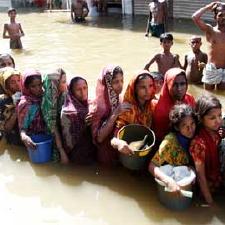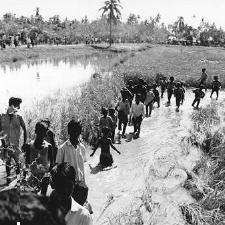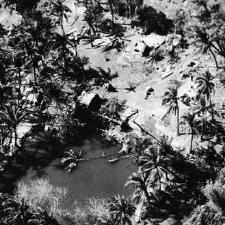Adil Najam
 It wiped out villages. Destroyed crops. Over 3.6 million people were directly affected. Nearly 85% of the area was destroyed. Three months after the catastrophe some 75% of the population was receiving food from relief workers (more here).
It wiped out villages. Destroyed crops. Over 3.6 million people were directly affected. Nearly 85% of the area was destroyed. Three months after the catastrophe some 75% of the population was receiving food from relief workers (more here).
It happened in Pakistan. Yet few Pakistanis even know of it by name. Fewer still remember that it eventually contributed to Pakistan’s break-up.
The 1970 Bhola cyclone hit then East Pakistan on November 12, 1970. It brought with it winds of an unbelievable 185 km/hr. It left in its wake a half million Pakistanis dead.
Meteorologists remember it as being one of the most deadly natural disasters in human history – sources suggest that it left between 300,000 to 1 million Pakistanis dead in its wake; most estimates suggest around 500,000 Pakistanis died.
Historians tend to agree that although there were many other forces at work, the devastation caused by the cyclone and the widespread view that the government had mis-managed the relief efforts and West Pakistan had generally shown an attitude of neglect, contributed to high levels of anti-West Pakistan feeling, a sweeping victory for the Awami League, and eventually the breakup of Pakistan and the creation of Bangladesh.
Such, then, are the forces of nature. And such are the forces of history.
As we hear newspaper headlines proclaiming the historic magnitude and devastation wrought by the floods on our plains, it is worth remembering that 40 years ago The New York Times was describing another calamity in Pakistan as the “Worst Catastrophe of the Century.” Much more importantly, we should pay close attention to the lessons of history, and the lessons of nature.
The lesson of how policy mismanagement led to public dissatisfaction and eventually contributed to national dismemberment is a stark reminder. It may not be an entirely applicable parallel since so much more had already happened and gone wrong in the East Pakistan case (and the cyclone was a contributor to, not the cause, of how history unfolded) but it is a lesson that should not be lost on the politicians, policy-makers and people of Pakistan.
The famous national song, “Ghar Tou Akhir Apna Hai” by Shahnaz Begum was, in fact, written in response to Bhola:
There is a reason why disasters require national solidarity. Without it, they can become even more disastrous and deeply buried fissures in the social fabric can burst forth in volcanic anger. As we look around at the political, policy and citizen response to the current floods, one sees too many who wish to turn disaster into a political opportunity. Those who do would be well advised to remember Bhola. Indeed, we would all be well advised to remember Bhola. (Some of these implications, including on the swell on anti-West Pakistan feelings in the 1970 elections, is discussed in my later article on the political implications of Cyclone Bhola, here).
I write these lines with some trepidation and with great caution. History is not a predictive science. And I do not believe that there is a real parallel between the two situations.
But I do believe that there are important lessons to learn from our own mistakes. For the sake of our present, if not of our past, let us resolve not to make the same mistakes again. Let us not forget what is the real lesson of Bhola in 1970, as of so many other tragedies: dissatisfaction in times of crisis can be a force of agony, and political catastrophe can sometimes grow from seeds sown in natural disaster.
























































Can you be more specific about the content of your article? After reading it, I still have some doubts. Hope you can help me.
Impressive clarity and structure. ???? Watch Live Tv online in HD. Stream breaking news, sports, and top shows anytime, anywhere with fast and reliable live streaming.
This is my first time pay a quick visit at here and i am really happy to read everthing at one place